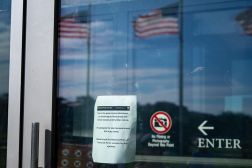Agencies face cyber concerns as apps rely on aging systems — report

Agencies are still overwhelmingly dependent on legacy IT systems, a Dell survey released Tuesday has found.
More than 70 percent of the 100 federal IT business decision-makers polled in Dell’s State of IT Trends 2016 Study said their agency is using old operating systems to run important mission applications.
And a little more than half of respondents said their agency is using software or systems that are no longer vendor-supported, according to the report.
“Running legacy systems that are unsupported creates significant vulnerability in government systems,” Dell Federal Chief Technology Officer Cameron Chehreh told FedScoop.
In light of incidents like the Office of Personnel Management breaches, Chehreh said cybersecurity is “becoming one of the driving imperatives I think of our generation.”
[Read more: OPM: Stolen biometric data list grows by 4.5 million]
“We know what the survey results dictated to us but we have to move with a sense of urgency — not to get people modernized necessarily from a functional perspective but to create greater cybersecurity capabilities,” Chehreh said.
When asked to cite concerns with legacy IT the most frequently mentioned was cybersecurity, by 42 percent of the survey’s respondents, according to a press release.
“Cybersecurity, from a discussion perspective, has reached such a tenor that it’s a mainstream discussion across the entire United States,” Chehreh said. “The normal American… recognizes the value and importance of cybersecurity.”
He added: “We must now operate in a very different manner to assure the privacy information that the civil agencies have is protected with the utmost that we can offer, and the most modern techniques and technologies.”
Both Microsoft Windows 7 and Windows 8 have passed their “end of life,” the release notes, but many respondents reported still using one of the two systems.
“We’re at a point and time within agencies’ histories that we can no longer look at delaying modernization strategies,” Chehreh said.
He said several external forces, including budgetary pressures and cybersecurity concerns, are coming together to create “a perfect storm for our government.”
Chehreh cited three things he said are holding agencies back in efforts to modernize: funding, the acquisition model and understanding where to make low-risk, low-impact changes that enhance the mission.
“Being able to modernize acquisition process is vital,” Chehreh said. “It’s extremely important.”
In terms of funding concerns, Chehreh said he thinks U.S. CIO Tony Scott’s efforts to address funding for modernization “are the right conversations to be having, but the right solution, I think, is still yet to be determined.”
“Agencies are being extremely proactive and creative in how they’re trying to address it under the current way that funding works, right, so that is clearly a near-term opportunity,” he said. “We need to look at the mid- and long-term solutions that create the proper balance for everyone.”
One interesting finding of the survey, Chehreh noted, was that 24 percent of those polled said “agencies’ lack of knowledge about available solutions” was an obstacle to modernization. And 22 percent cited “conflicting digital transformation strategies” as an obstacle.
“It was fascinating to me that there was a lack of knowledge with regards to capabilities that were available to the government in order to address some of those modernization concerns,” Chehreh said. “What this shows me is that although people do want to drive forward and they do want to see modernization occur, we still have a percentage of people that we haven’t been communicating to clearly or effectively enough to give them the tools they need to succeed in modernization.”
The online survey was performed in May by PSB for Dell.






